Two friends were walking down a countrylane.
One believed in God; the other did not.
Said the atheist to the theist,
"We have had God
and religion for thousands of years and yet evil thrives in
this world. Hatred, crime, war and immorality is
getting harsher than ever," he further sliced the
theist with doubled sarcasm," what good has been
your God or your religion?"
The theist kept quiet and digested the raw rancour
with a smile.
They strolled on.
Once again the atheist swung his sword of sarcasm,
"With so much unrighteousness around, what good
has your God and religion done?"
And again, the theist silently advanced on.
Up ahead, they saw a young boy splashing in a
muddy puddle. He was covered all over by mud.
Hitting at the boy, the theist turned to his friend and asked,
"Tell me, what good has soap been to this world.
We've had it for so long ..."
"But you have to use it!" snapped the atheist.
"Exactly! You have to use religion, accept God and His teachings
in your life to see the benefits."
The dialogue finishes here.
But as is the case with many non-believers, some would argue, "I can see the soap. I can see its foams and suds; and its cleansing process. But, with God, I can't see Him with my eyes! Only when I know God through my senses will I accept Him."
Our inability to understand the existence and nature of God through material senses has given added momentum to atheistic cults. One who believes in God is often attacked as "primitive," "Out-of-fashion," "Only for the weak-minded and not for the modern and scientific brains."
As the so-called modern, scientific understanding is based on knowledge acquired through material senses, we reject God.
But is it a fault of God if our scientific senses are too feeble; insufficient, inaccurate and underqualified to know the glory of His being?
Careful analysis shows that our knowledge through the material senses is defective. There are a lot of discrepancies. First of all, the senses themselves are limited, thus imperfect. Secondly, we easily become illusioned. Thirdly, we make mistakes. And fourthly, we lack experience.
Let's have a closer look at these four limitations.
1.Imperfect Senses
It is true, human senses are powerful, but not powerful enough. There is much we can't see! Much we can't hear! Even to get accurate information about the external world, our senses have physiological limits, or 'thresholds of perception.'
Take the eye, for example.
A human eye cannot see through walls; it is blind to x-rays, ultra-violet rays and the infra-red! We can only see a tiny fraction of the total electromagnetic spectrum. An electromagnetic wave can range from one quadrillionth of a metre upto 100 million metres in length. And of this immense array of energy, we can see only the wavelengths between 400 and 750 millimicrons long (a milli-micron is a billionth of a metre). This we call the visible spectrum. And anything outside this range is invisible. Our visible spectrum is shockingly small and shrinks to near insignificance when compared to the vast section of waves that remain invisible.
Our eyes can see only 0.00000000000035% (3.5 x 10¯¹³) of what is there to see. To visualise this infinitesimal figure, if we take the population of one earth as 6 billion and collect 2 million such earths; out of the total number of people before us (2 million x 6 billion) we would see only 42! This is the stunning limitation of the human eye!
And in this frail band of vision lies our wonderful world of colours!
Our hearing is limited as well. No human ear can hear the dog whistle! Its frequency is beyond the range of human hearing. Sound waves are measured in Hertz (cycles per second). Our hearing extends from 20 Hertz upto 20,000 Hertz. And we are deaf to any vibration above or below this range.
Each of our remaining senses exhibits similar limitations.
So our senses are limited, imperfect. But what of scientific instruments! Can't they help us get more perfect knowledge! Not really.
Nobel prize-winning physicist, Eugene Wigner points out, "Even if we photograph the stars, we must eventually 'take in' by our senses what the photograph shows. Furthermore, without our senses, we could not handle a photographic camera. Clearly, all knowledge comes to us ultimately through our senses."
So even if refined by instruments, ultimately, whatever knowledge we gain through sense perception is no more perfect than our imperfect senses.
2. Illusions
Even within our limited range of perception, we suffer from illusions. You only have to ask a magician and he'll demonstrate how easy it is to deceive a person through illusions. He has hundreds in store up his sleeve.
Our eyes are most easily illusioned.
Many of us have seen mirages on a hot summer day. As you drive down the highway you see what looks like small puddles of water up ahead. But in reality they are just illusions.
As school kids we studied 'refraction' in physics. If you fill up a glass beaker with water and partially immerse a pencil in it, the part of the pencil in the water appears bent - an illusion due to refraction of light.
If you stand between the railway tracks at ground level and look at the tracks as they stretch ahead, they don't seem to be parallel. They appear to converge and meet at a far distant point. But we quickly realise that our eye is lying.
Are the center dots in both figures the same?
fig..
Psychologists and other students of perception have done much research into illusions, particularly in the realm of vision (see illustrations).
The sense of touch is also highly susceptible to illusion. If you cool your right hand sufficiently in water at 5°C and then dip it in a trough of water at 15°C, the water will feel 'warm.' But if your left hand has been preconditioned in 20°C water, then the trough of 15°C will feel 'cool.' Though the water is the same, it simultaneously feels both 'warm' and 'cool.'
Hearing. Most of us have been fooled at least once. We have turned to what sounded like someone calling out our name, only to find out in embarrassment that it was a fault of hearing or a trick of the ear!
Spooky or strange sounds and uncanny noises are also sound illusions, which the ear bears when the mind is scared.
Taste. The tongue lies not only through words. If after having eaten a sweet chocolate or some sugary foodstuff, you drink tea; the tongue reports an absence of sugar. But in reality, the tea does have sugar. It is an illusion of taste!
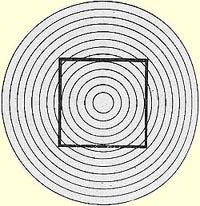
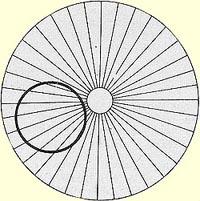
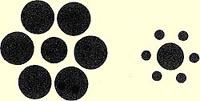
Try tasting an orange after tasting sugar, the orange will taste sweet. Try the orange after a lemon, and the same orange will taste sour!
- Is the diagonal line straight?
- All the horizontal lines are parallel, but they do not appear so!
- The bright white triangle which seems to overlap the dark circles and V-shaped lines is an illlusion.
In short, all our senses, apart from being limited in power are subject to illusions.
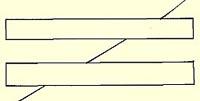

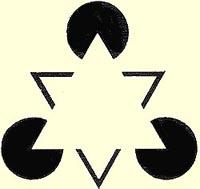
3. Mistakes
With our imperfect senses and our illusion-prone mind, mistakes are inevitable. "To err is human."
The Challenger space shuttle was definitely the best production of top brains in science. Yet something went wrong. What began as a spectacular space expedition ended in a nightmarish fireball! Some unknown mistake had been made. A mistake that shook NASA and brought tears to humanity. Sadly, many such mistakes have been a part of human history!
Dr. R.C. Gregory, Director of the Brain and Perception Laboratory at the University of Bristol, England, says, "Science with all its dramatic successes, had from its beginning also generated wildly incorrect accounts; stars were believed to be pinpricks in a crystal ball, electricity and heat as fluids, the brain as an organ to cool the blood... These are dramatic deviations from what we now see as truth; and when invented they were deviations from what then appeared true."
The tragedy of mistake-making has haunted humanity. Everybody knows that there was a time when Aristotle claimed that the earth was stationary, the centre of the universe and the sun revolved round the earth. It passed unquestioned, until Copernicus, and then Galileo focussed his telescope towards the heavens to prove otherwise. The list of our past mistakes is appalling; the earth was considered to be flat and all matter as 'solid.' But today, the earth is a globe and nothing seems to be 'solid.' At subatomic levels, everything is forces, and more forces.
In another instance, three astronomers recently discovered a significant mistake in the 'Hubble Constant,' an equation used as a cosmic yardstick to measure enormous distances in the universe. The 'Hubble Constant' - named after astronomer Edwin P. Hubble - has undergone so many corrections since he first formulated it that many astronomers now laughingly call it the 'Hubble Variable.'
As new frontiers of knowledge are explored, man changes his old views. In the light of higher knowledge our old theories, howsoever dear to us, have to be rehashed or replaced. Is it not possible then, that when higher wisdom dawns upon us that the 'no God' theory will have to be dumped in the junkyard of human mistakes?
4. Lack of Experience
Behind many mistakes is lack of experience. It makes us professional mistake-makers. Whatsoever we undertake to study, without the necessary experience in the subject, we are always likely to misunderstand or not understand at all. If Einstein himself knocks on your door and presents to you his prized paper of Relativity Theory, will you be in a position to understand it?
Never: If Physics is like hieroglyphics to you and you know nothing of the subject.
No: Even if you know physics but have not the requisite depth.
Yes: If you are equipped with enough insight in physics and are thoroughly grounded in it.
How likely is a man, ignorant of science and mathematics, to appreciate the formula E=mc². Even if the scientists themselves demonstrate all the proofs, will he follow the logic of proofs?
Thus, it is plain logic that to read a book in Chinese, I must first train myself in the Chinese language!
And if someone who has no idea of what a number is demands that I logically show that two plus two is four. I can't do it. Similarly, if a spiritual ignoramus demands that God be logically demonstrated to him, his very request is illogical!
And given the proof of God, would he, a materialist know how to read it?
Even if God himself were to appear before him, he would fail to understand Him, for he lacks sufficient spiritual experience!
Conclusion
We can logically conclude that the perfect, infinite personality of God cannot possibly be understood by our limited, illusion-ridden, inaccurate and inexperienced senses.
Does it mean that we can never know God?
No. Even with all these severe handicaps, there is still a way to realise the Supreme.
The colossal gap between us and God can be bridged This bridge is the genuine Sadhu who is infallible in spiritual wisdom; who is in constant communion with the Supreme at one end and in humanly touch with us on the other. He links us mortals with the Immortal. He guides us and acquaints as with spiritual sadhana. And through his company and training a person rises above the material limitations. This process of rising is known as Divinisation.
Bhagwan Swaminarayan explains: "When a person undergoes genuine spiritual training under the care and company of an enlightened Sadhu who reveals to him the glory of God, his senses and mind become divine. Graced with such a divine vision he is able to see God in human form and develops a firm conviction about His supremacy. Otherwise it is impossible to see God with the material senses." (Vachanamrut Gad.I. 51)
Bhagwan Swaminarayan further describes in Vachanamrut Sarangpur 2 that when a person thus realises God, his power of perception transcends all barriers and he can hear everything being said in any corner of the cosmos and see everything anywhere in the multiple universes.
There cannot be more convincing words than God's own. And once you've tasted the bliss of God, doubts disappear like darkness before the sun.
To understand what I mean, I leave you with this last incident.
Addressing a packed audience, an atheist vociferously defied God with proof after proof. His mastery of words and logic left everyone stunned. He arrogantly challenged from the stage.
"Can anyone contradict me? Or wishes to attempt proving God to me?"
A heavy hush engulfed the listeners.
Then an old man limped up onto the stage with anxious faces monitoring him as he took his stance before the microphone.
Surprisingly he said nothing. Instead, he picked out an orange from his pocket and began peeling. Minutes ticked by. Everybody was intent on listening to his defence. Yet he quietly, with head down, kept on peeling.
The atheist breathed fire, "Old man have you nothing to say? Or have your ideas suddenly vanished and you can't find words?"
While the atheist belittled him, the old man finished peeling. He waved a hand and broke his silence. Then placing a segment of the juicy orange in his mouth and sucking it with delight, he turned to the atheist and said, "Can you tell me the taste of this orange?"
"How can I? I haven't eaten it," he retorted.
The old man faced the audience.
"Can anybody describe how this orange tastes?"
Silence.
| Van Gogh
Some illusions are apparently caused by odd imperfections in our sensory apparatus. As the famous painter Vincent Van Gogh reached the end of his life, he began depicting shining objects (such as the sun) as if they were surrounded by concentric rings of colour. For a long time art critics were convinced that Van Gogh had "broken through a new level of reality" by letting his imagination run free. If this were the case, then we might say that Van Gogh was hallucinating the circles around the sun that he so often painted. But we now suspect that Van Gosh suffered from a dreadful disease that was systematically destroying his nervous system. One of the symptoms of this particular illness is that the person's vision becomes cloudy and all bright lights have halos around them. It is likely, then, that Van Gogh was suffering from the same kind of illusion that you can experience if you look at a streetlight on a foggy night, or watch a full moon through a thin layer of colours.
|
"Scientists, sociologists, professors and people of much greater intelligence than me are present here, and yet, nobody knows the taste of this orange. Only he who eats it knows how it tastes. It is the same with God. Only he who has experienced Him and tasted His bliss knows that He forever exists."
Dear reader, for a person who genuinely wants to know God, God is nearer than his own heart, God is as clear as sunshine! .